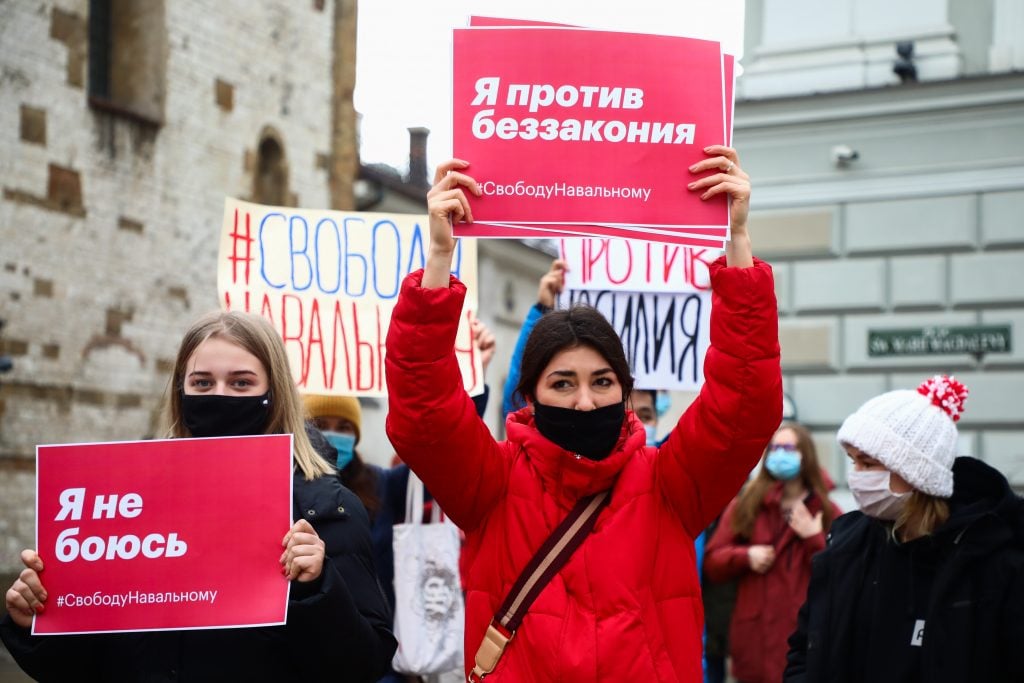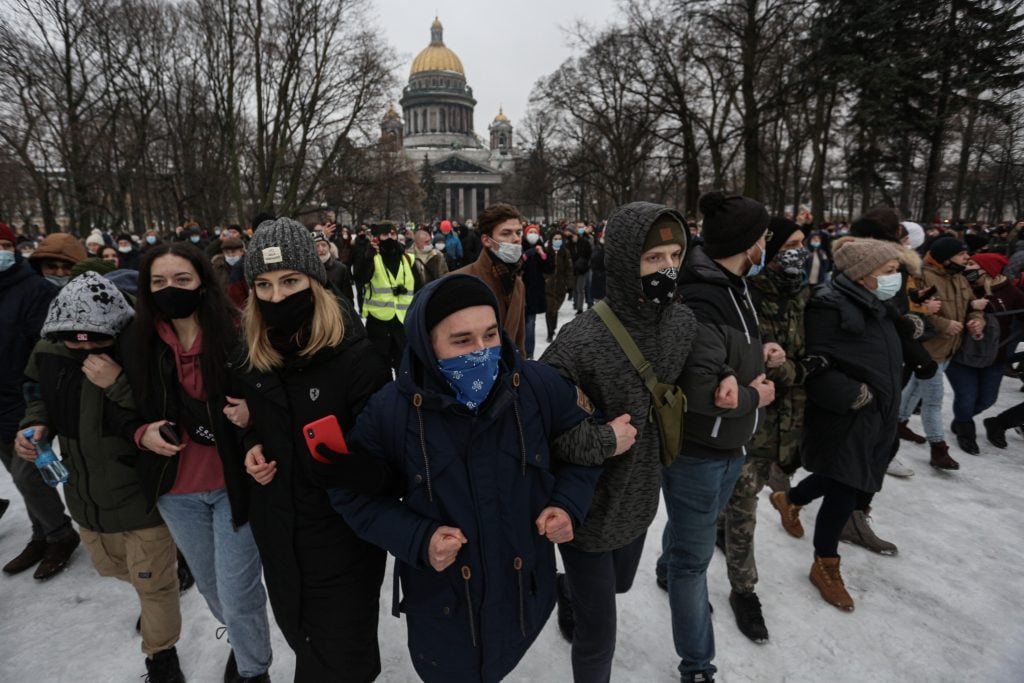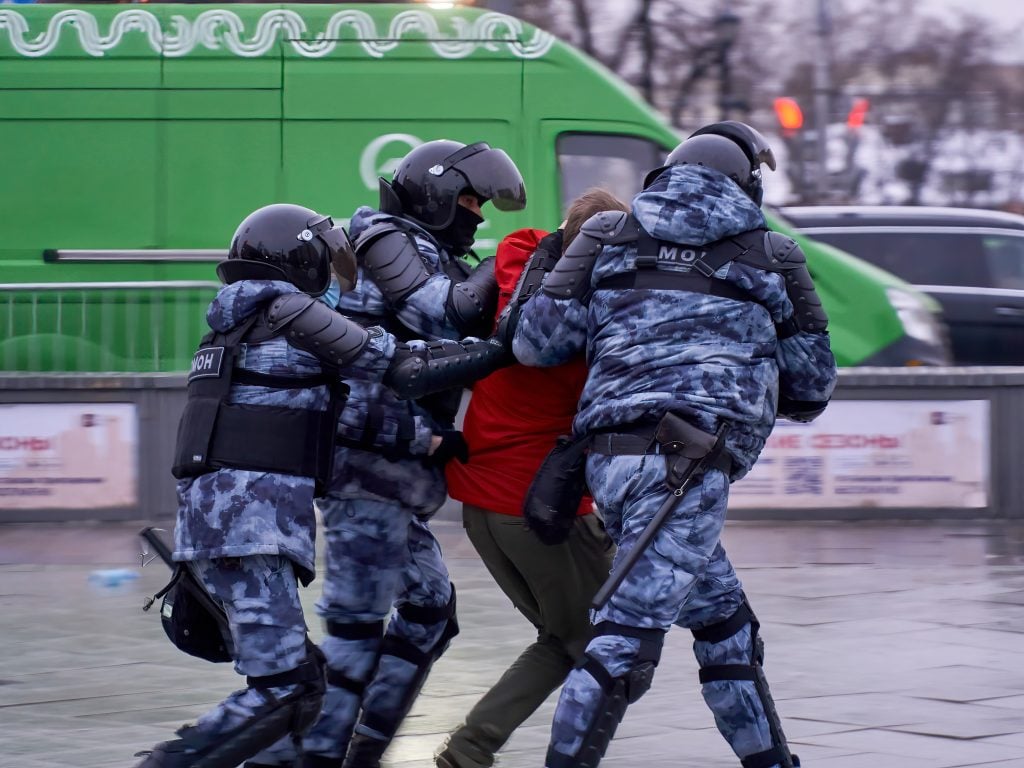Politics
Three Members of Pussy Riot Were Arrested in Russia’s Mass Protests Against the Jailing of Opposition Leader Aleksei Navalny
The activist artists were among the thousands calling for the release of the jailed anti-corruption activist.

The activist artists were among the thousands calling for the release of the jailed anti-corruption activist.

Sarah Cascone

Three members of Pussy Riot, the punk band and performance art group, were among the 3,000 protesters arrested in Russia on January 23 during the nationwide demonstrations calling for the release of jailed opposition leader Aleksei Navalny.
Neither freezing temperatures—it was minus 60 degrees Fahrenheit for protesters in the sub-Arctic city of Yakutsk—nor a violent response by armed police deterred the rallies, which decried the recent detainment of Navalny, an outspoken critic of Vladimir Putin who was poisoned in August. Pussy Riot members Masha Alyokhina, Viktoria Naraxsa, and Lucy Shteyn were among those arrested in Moscow.
Narakhsa and Shteyn received 10-day jail sentences, while authorities fined Alyokhina 30,000 rubles ($400).
“All my bank accounts are blocked for several years because of these fines,” she told Artnet News in an email, describing the huge police brutality and violence” she witnessed at the protest.
“Without collective action, we won’t be able to get Alexei Navalny and other political prisoners released,” said Pussy Riot’s Nadya Tolokonnikova in a Facebook video last week. She later offered advice on YouTube about how to respond if detained by police during protests.
In Yekaterinburg, street artist Tima Radya, sometimes described as the Russian Banksy, was detained by police, the Art Newspaper reports.
Radya had encouraged Russians to voice their discontent with the government the day ahead of the protests, instructing his followers on Instagram to “go out on the streets tomorrow, do not be afraid of anything.”

Supporters of the politician Alexei Navalny during a rally in St. Petersburg, Russia, on January 23, 2021. Opposition politician Alexei Navalny has returned after poisoning from Germany to Russia and was detained at the airport in Moscow. Photo by Valya Egorshin/NurPhoto via Getty Images.
Spies working for the Russian government poisoned Navalny with a highly toxic nerve agent called Novichok while he was visiting Siberia in August. He fell into a coma, but was permitted to travel to Germany for treatment, and awoke after nearly a month.
Now an international hero, Navalny returned to Russia last week, knowing he would be arrested. Police officers greeted him at the airport.

Police officers detain a protester during the demonstration. Rallies were held in the largest cities of Russia in support of the opposition leader Alexei Navalny, who was sent into custody after returning to Russia from Germany on suspicion of evading the control of the FSIN (Federal Penitentiary Service). The actions were accompanied by arrests on an unprecedented scale. Photo by Mihail Tokmakov/SOPA Images/LightRocket via Getty Images.
Adding fuel to the growing discontent over Navalny’s detainment, his nonprofit organization, the Anti-Corruption Foundation, unveiled “A Palace for Putin,” a video purporting to showcase Putin’s massive, $1 billion Black Sea mansion—Navalny dubbed it a “new Versailles.” It has been viewed over 90 million times.
The protests represent a significant challenge to Putin’s regime, reports the New York Times, but it remains to be seen if they will be able to loosen his iron grip on Russian government.